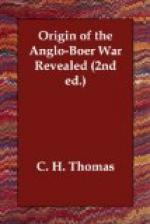For Government supplies and public works the tenders of burghers only, and perhaps of some privileged persons, are accepted. In many instances the tenderers are without any pretence of ability for the performance of the contract, but are nevertheless accepted, performing only a sub rosa role. One such instance occurred some years ago when a burgher who did not possess L100—a simple farmer and a kind of “slim” speculator—received by Volksraad vote the contract for building a certain railway.[3] The price included a very large margin to be distributed in places of interest—as douceurs of L1,000 to L5,000 each, and L10,000 for the pro forma contractor and his Volksraad confederates; all those sums were paid out by the firm for whom the contract was actually taken up.
Similarly in contracts for road making, repairing, and making streets, etc., etc. On one occasion a rather highly placed official obtained a contract for repairing certain streets in Pretoria for L60,000. The work being worth L20,000 at most, the difference went to be shared by the several official participants.
One of the first instances of glaring peculation occurred about fifteen years ago in relation with the Selati railway contract obtained by Baron Oppenheim.[4] The procedure was publicly stigmatized as bribery. It had transpired that nearly all the Volksraad’s members had received gifts in cash and values ranging each from L50 to L1,000 prior to voting the contract, but what was paid after voting did not become public at the time of exposure.
The acceptance of those gifts was ultimately admitted, in the face of evidence adduced in a certain law case; denial became, in fact, impossible. The plea of exoneration was that those gifts had been freely accepted without pledging the vote. The President publicly exculpated the honourable members, expressing his conviction that none of them could have meant to prejudice the State in their votes for the contract; and as there had been no pledge on their part, the donor had actually incurred the risk of missing his object. From that time the practice of obtaining and selling concessions or of sinecures and other lucrative advantages grew quite into a trade; and receiving douceurs became a hankering passion from highest to lowest, but happily with not a few exceptions where the official’s honour was above being priced.
There was nothing shocking in all this venality to the bulk of the Johannesburg speculator class and others of that category. The rest assessed official morality at a depreciated value, but hoped the blemishes might be purged out with other and graver causes for discontent, if Uitlanders, were only granted some effective representation in public matters. That appeared to be the only constitutional remedy. But this continued to be resentfully refused, even in matters which partook of purely domestic interest, such as education, municipal privileges, etc. The latter were opposed upon the specious argument that such extended rights would constitute an imperium in imperio, and thus a condition incompatible with the safety and the conservation of complete control.




